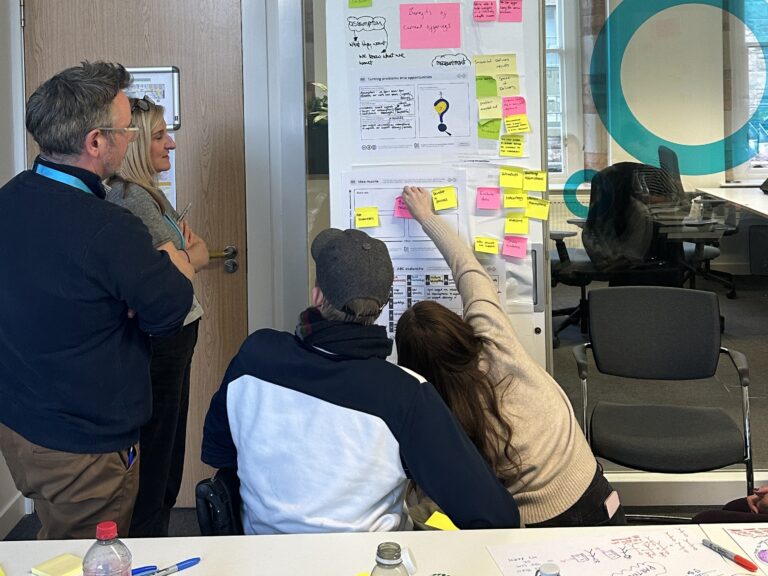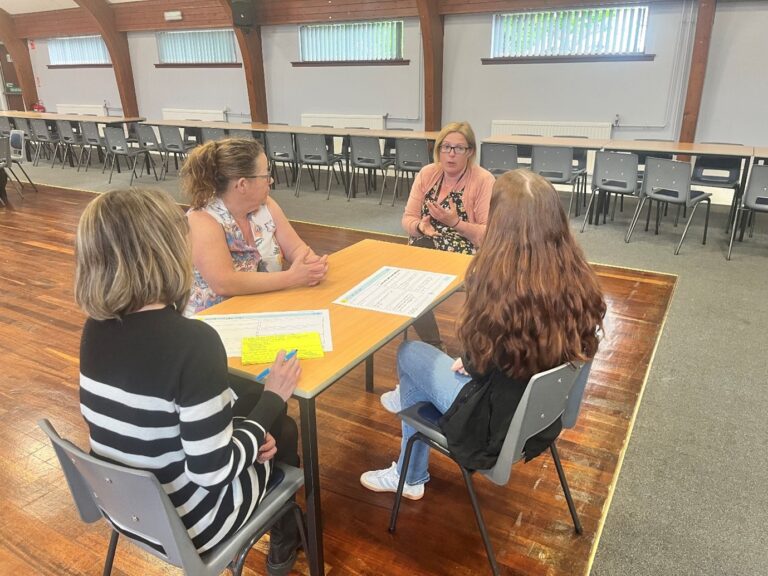The Service Design Academy is no different from any organisation having to make rapid change in the past few months.
We lost our way during the crisis. We’ll hold our hands up – ashamedly we forgot our service design roots.
We were reacting. We were making assumptions. We were in very real danger of delivering fast solutions, but not great solutions.
There was only one impressive development – Chris’s lockdown moustache which entertained us no end during daily Teams Meetups!
We drew breath, we sat back and put our foot on the brake
Back to the drawing board
We got back on track by doing User Research. We reached out to our networks. We surveyed future learners. We listened to critical friends.
Like many others remote learning, or rather remote facilitation, wasn’t at the top of our skill set. We learned the hard way. We joined workshops from a variety of providers. Some gave us hope, while others made us feel doubtful/less inspired. Where trainers had simply moved their face to face format online, we quickly got bored, stiff and sore. Let’s face it, no matter how engaging the topic 6 hours in front of a laptop does not make for a good learning experience! We didn’t want to deliver this lacklustre experience. Service Design is such a hands-on, learn by doing exercise, we fretted over how to make this work remotely.

One of our partners we turned to was Andy de Vale. Andy’s company Workvisible has been delivering remote workshops for up to 400 people for some time. He’s an expert in his field. Andy was also creating a Remote Facilitation Workshop, so we jumped at the chance to Beta Test his model. Andy taught us so much over two weeks. How to really engage remote learners. The preparation that must go into online workshops. The value of a buddy when you’re learning remotely. How bringing an element of competition engages everyone and builds you a toolkit at the same time! And most importantly, we learned a lot about how to use online collaboration tools well.
The journey with Andy was insightful and rewarding. Andy’s visual facilitation skills give a deeper level of understanding than the written word. It’s a joy to watch him at work.
We took the unusual step of bringing clients and other educators, from Dundee & Angus College where we are based, into our learning. This allowed us to upskill and gauge reactions from people we’d worked with in the past, hear their views and get their feedback on what our new learning should look like.
We practised
Andy’s learning, like ours, is a ‘learn by doing’ approach and as part of his course we designed, developed and tested online workshops. We delivered around 20 workshops and networking events to test various tools and techniques.
We Learned
- The learning must start before the workshop. Participants may not be familiar with the online collaboration tools so gaining confidence in using these must be part of the learning.
- Digital literacy and netiquette are a must - for the facilitator and the participants. No matter how much planning and preparation we do, we will hit technical issues that’s why we have someone, not engaged in delivery, to help with these through the chat box and offline if necessary.
- Diverse communication skills are paramount. Everyone likes to learn differently. We have course content that participants can read or view and importantly, re-view.
- Participants don't have to be computer whiz-kids. But they should have a positive attitude and an open mind about learning new things and interacting with others in the digital world.
- In the online environment, extroverted and introverted participants stand on equal footing which can result in more even, open, and honest discussions. We leave time for these to happen.
- Teaching online becomes less about teaching information and more about facilitating participant efforts to think critically, apply and make sense of new knowledge.
- User research told us that participants wanted a half day workshop, with a break. So, moving our two-day bootcamps couldn’t be exactly replicated online.
- We are working in a very different world and the way course work happened outside the classroom before will no longer apply. We’ve reviewed and adapted to suit these changing times.
With people logging on from all over the globe, you tap into endless possibilities for bringing together diverse people, cultures, communities, and cities that expand the learning opportunities based on unique experiences and perspectives.

We’re Testing
And finally, we’re taking our learning to the test track. We’ve recruited a group of individuals with varying knowledge and skills willing to test the learning before we go live. Our curriculum will be improved based on that feedback and, as always, on developments within the field of service design.
We’re in a strong position now to take our foot off the brake by welcoming our first online PDA cohort in September. We’ll continue to listen to our customers and learn from industry experts. It’s the only way for us to make the best possible impact and deliver the best possible learning experience.



